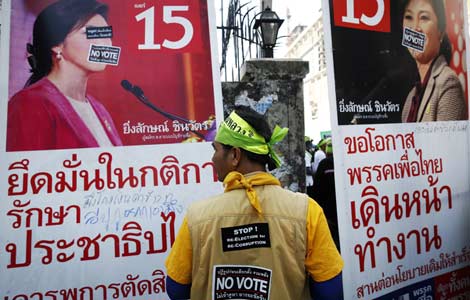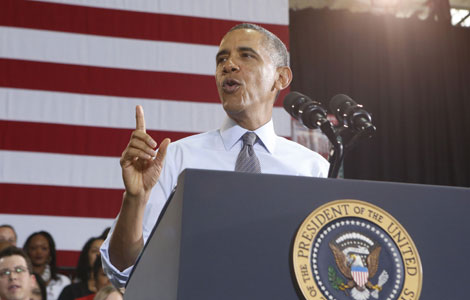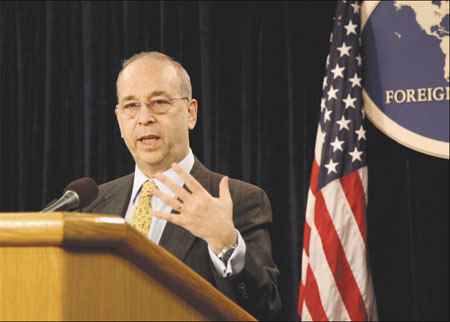US envoy counsels restraint
Updated: 2014-02-05 11:54
By Chen Weihua in Washington (China Daily USA)
|
||||||||
|
Daniel Russel, US assistant secretary of state for East Asian and Pacific affairs, talks to reporters on Tuesday at the Foreign Press Center in Washington DC. Sun Chenbei / China Daily |
The top US diplomat for East Asia has called for restraint and diplomacy amid growing tensions between China and Japan over historical issues and the territorial disputes in the East China Sea.
Daniel Russel, assistant secretary of state for East Asian and Pacific affairs, said his primary concern is the global economy.
"The global economy is so important and frankly so fragile that we can't afford to have world's second and third largest economies at odds. We can't afford to have Japan and China, let alone Japan, China and Korea working at cross-purposes," he told a press conference in Washington on Tuesday.
"Japan and China, two major economies and two important partners in the Asia-Pacific region, can and must work together in their own strategic interest, in the best interest of their own citizens, and certainly in the best interest of the region," said Russel, who returned from a visit to the region last week, along with Deputy Secretary of State William Burns.
He said the US, along with each country in the region, has strong vested interest in lowering tensions and improved diplomatic relations and close cooperation in Northeast Asia.
"Frankly, restraint, good judgment and diplomacy along with dialogue, are the essential ingredients for creating the kind of region and obtaining the benefits from the Asia-Pacific region that we all want," said Russel, who took up the post last July after serving as special assistant to the President and National Security Staff senior director for Asian affairs.
Russel said he has had in-depth and candid talks with his counterparts in Beijing, Tokyo and Seoul over all these complicated issues.
"There are multiple perspectives, but one thing is certain. None of these problems, none of these tensions can be solved by any one party alone. There is a role for every country in contributing to a virtuous cycle of improved relations," he said.
He emphasized that although the US doesn't mediate the dispute and tension between the Chinese and Japanese governments, it has a strategic interest in the peaceful resolution through diplomatic means of those disputes and the reduction of tensions, including maritime issues as well as historical ones.
Tensions between China and Japan have grown since late 2012 after the Japanese government nationalized the disputed Diaoyu Islands in the East China Sea. The visit on Dec 26 by Japanese Prime Minister Shinzo Abe to Yasukuni Shrine, where Japanese war dead, including 14 Class-A war criminals from WWII, are honored has angered both China and South Korea, which see the shrine as symbol of Japanese militarism that inflicted enormous suffering on the people in the region.
The US has also repeatedly expressed its disappointment at Abe's visit, describing it as a move exacerbating tensions in the region.
Meanwhile, China's declaration last November of its East China Sea Air Defense Identification Zone also drew criticism from Japan and the US.
On Tuesday, Russel reiterated that the US does not recognize the ADIZ and the declaration does not change the way the US conducts its military operations in the region. He described the move as increasing the risks of miscalculation, confrontation or accidents.
China has stated that since more than 20 countries, including the US and Japan, have declared their ADIZs a long time ago, China's announcement should not come as a surprise.
Russel said the US has urged China not to implement the ADIZ and certainly not to replicate it in another sensitive area. His words were in response to Japanese news media reports that China plans to set up ADIZ over the South China Sea.
However, Chinese Foreign Ministry spokesman Hong Lei on Tuesday described the Japanese report as having "ulterior motives" and "aimed at diverting international attention and covering up its attempt to revise its pacifist constitution and expand its military power."
He said China, as a sovereign state, has all the rights to safeguard national security by any means, including establishing the ADIZ in response to the situation of air security. "China hopes that relevant parties can be cautious about their words and deeds, maintain a calm and objective stance and work together with China to make a concrete contribution to peace and stability of the region as well as security in the area and on the seas," Hong said.

He emphasized that China-ASEAN relations enjoy a bright prospect. "China and ASEAN countries are working together to implement the Declaration on the Conduct of Parties in the South China Sea in a comprehensive and effective way to safeguard peace and stability in the region," Hong said.
Zhu Zhiqun, professor of political science and international relations at Bucknell University, said the trust between Japan and China has completely disappeared after Abe's Yasukuni visit. "The burden is now on Japan," he said.
He said US efforts to rein in Abe's adventurist moves have failed so far. "A major reason is that Abe is very pro-America and the US needs him. The US side may be dissatisfied with what he does sometimes, but Abe fits in very well with America's 'pivot' to Asia," Zhu said.
Zhu believes the US is in a dilemma. "It has to achieve a balance between defending a loyal ally and forming a constructive relationship with a rising power," he said.
"Obviously the US will tilt toward its key ally in any dispute between its ally and a rising challenger," he said.
chenweihua@chinadailyusa.com
(China Daily USA 02/05/2014 page1)

 Storm to slam two-thirds of US
Storm to slam two-thirds of US
 Clowns gather for Joseph Grimaldi celebration
Clowns gather for Joseph Grimaldi celebration
 In teen star transition, Bieber may want to emulate Miley
In teen star transition, Bieber may want to emulate Miley
 Thai caretaker PM urges protesters not to block voting
Thai caretaker PM urges protesters not to block voting
 Holy waters in Nepal
Holy waters in Nepal
 Kongfu stars wax shine in London ChinaTown
Kongfu stars wax shine in London ChinaTown
 Obama pushes minimum wage hike
Obama pushes minimum wage hike
 Getting ready for some football
Getting ready for some football
Most Viewed
Editor's Picks

|

|

|

|

|

|
Today's Top News
Data show rebalancing, not weakness: economist
US envoy counsels restraint
Will LinkedIn make it in China?
Obama to visit Jefferson's estate with Hollande
US braces for falling deficit
US Senate okays ambassador nominee to China
Anti-graft agency to widen net
US Senate passes farm bill
US Weekly

|

|






